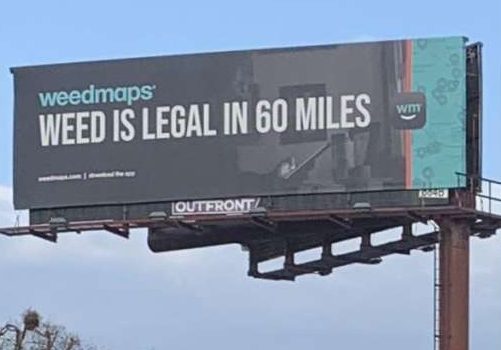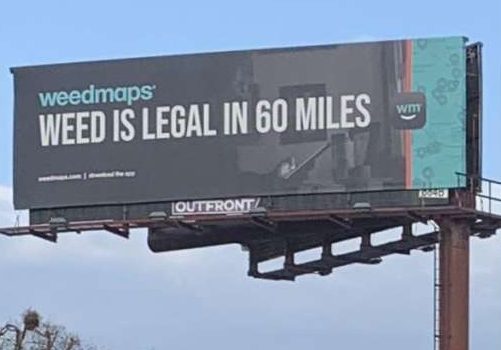
A Weedmaps billboard near New Haven, Connecticut reading “Weed Is Legal In 60 Miles” — a reference to Massachusetts’ newly legalized cannabis market — has caused quite a stir.
Weedmaps’ billboard has been catching the attention of several local news outlets since it went up along I-91 in January. While some news reports highlighted how the billboard’s message might raise awareness of legal adult-use marijuana in the neighboring state, others focused on local backlash.
State law enforcement warned about the legal ramifications of bringing cannabis from Massachusetts back across the state border, and a local addiction treatment organization contended that the billboard might encourage recreational use among teenagers. A separate billboard, encouraging substance abusers to seek treatment, was later placed just down the road from the Weedmaps advertisement.
Messaging on a Weedmaps billboard in New Haven, Connecticut is being changed to focus on the businesses core values. (Photo courtesy of MJ Observer)
Local station Fox 61 reported that a gathering of protesters and counter-protesters gathered on Feb. 9 in North Haven outside the office of Outfront Media, the company that owns the billboard space, to voice their opinions about the billboard and its message.
The eye-catching billboard has now been swapped with the message “Your Guide to Legal Cannabis,” and, although the wording is now different, Weedmaps’ mission to support the ethical adult-use of cannabis remains the same.
Why is This Conversation Important?
Cannabis is legal for medical use only in the state of Connecticut. The state’s newly appointed Governor Ned Lamont (D) has stated publicly that adult-use legalization will be a priority of the next legislative session.
Meanwhile, adult use is legal in nearby Massachusetts and while people are focused on the drama of a roadside advertisement, they’re missing an important fact: According to the National Institute on Drug Abuse, Connecticut ranks in the top 10 states grappling with opioid deaths and marijuana is known to provide some relief.
At the heart of America’s opioid crisis lies a dramatic rise of opioid overdose-related deaths since the late 1990s. According to the National Institute of Drug Abuse, opioid use accounted for 49,000 of the 72,000 drug overdose deaths in 2017. Drawing from estimates provided by the CDC (Centers for Disease Control and Prevention), the New York Times reported that drug overdoses were the leading cause of death for Americans under the age of 55 that same year.
In 2018, a study published in the peer-reviewed journal Addiction concluded that “statewide medical cannabis legalization appears to have been associated with reductions in both prescriptions and dosages of Schedule III (but not Schedule II) opioids received by Medicaid enrollees in the US.” The reductions were significant: Medical cannabis legalization reduced by nearly 30 percent the number of Schedule III opioid prescriptions and dosage, as well as an approximate 30 percent decline in related Medicaid spending.
More and more, the medical community is becoming interested in the role of medical marijuana as an “exit drug” from many forms of addiction, from tobacco to opioids.
“Cannabis is the gateway to getting out of opioid abuse,” said neuroscientist Adie Wilson-Poe. “This is not my opinion. This is evidence that cannabis is an effective and safe substitute for pain-relieving drugs like prescription opioid analgesics.”
Cannabis is the gateway to getting out of opioid abuse. Click To Tweet
Dr. Dustin Sulak, D.O., an integrative medicine physician based in Maine, also contends that legal access to cannabis has a direct healing effect on communities. His practice combines the principles of osteopathy, mind-body medicine, and cannabis to address the health needs of his patients.
“Legal access to cannabis has been directly associated with a reduction in opioid-related deaths and hospitalizations, as well as reduced opioid prescribing. Surveys of medical cannabis users in the U.S. and Canada clearly show that patients are able to replace opioids with cannabis, and I’ve seen this first-hand in hundreds of patients.” Dr. Sulak said. “While we await gold-standard clinical trials, opioid users deserve legal protection and accurate education on how they can use cannabis as an exit drug.”
Changes on the Horizon
Connecticut residents will see a new billboard that reads “Your Guide to Legal Cannabis,” a message that better reflects the intention of Weedmaps, spokesperson Carl Fillichio said.
“We encourage and advocate for responsible consumption of legal, adult use cannabis,” Fillichio said. “Our site includes a Learn platform, which provides comprehensive and easy to understand information about cannabis use for both novice and connoisseur consumers.”
For communities where cannabis legalization is an ongoing – and often heated – debate, and substance abuse is of legitimate public concern, Dr. Sulak argues that discrimination and stigma surrounding the issues are of no help to opioid-using community members.
“It’s time for society to recognize that cannabis can be used safely and responsibly by adults wishing to improve their lives,” Dr. Sulak said.











